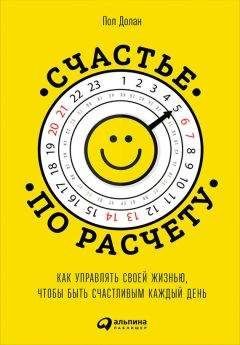Пол Долан - Счастье по расчету. Как управлять своей жизнью, чтобы быть счастливым каждый день

Помощь проекту
Счастье по расчету. Как управлять своей жизнью, чтобы быть счастливым каждый день читать книгу онлайн
270
Card D., Mas A., Moretti E., Saez E. Inequality at work: the effect of peer salaries on job satisfaction. American Economic Review 2012; 102: 2981–3003.
271
Senik C. When information dominates comparison: learning from Russian subjective panel data. Journal of Public Economics 2004; 88: 2099–2123; Akay A., Bargain O., Zimmermann K.F. Relative concerns of rural-to-urban migrants in China. Journal of Economic Behavior & Organization 2012; 81: 421–41.
272
Blanton H., Crocker J., Miller D.T. The effects of in-group versus out-group social comparison on self-esteem in the context of a negative stereotype. Journal of Experimental Social Psychology 2000; 36: 519–30.
273
Wadsworth T. Sex and the pursuit of happiness: how other people’s sex lives are related to our sense of well-being. Social Indicators Research 2013; 1–21.
274
Дахигг Ч. Сила привычки. Почему мы живем и работаем именно так, а не иначе. – Карьера Пресс, 2015.
275
Hofmann W., Friese M., Wiers R.W. Impulsive versus reflective influences on health behavior: a theoretical framework and empirical review. Health Psychology Review 2008; 2: 111–37.
276
Henningfield J.E., Cohen C., Slade J.D. Is nicotine more addictive than cocaine? British Journal of Addiction 1991; 86: 565–69.
277
Christakis N.A., Fowler J.H. The collective dynamics of smoking in a large social network. New England Journal of Medicine 2008; 358: 2249–58.
278
Lally P., van Jaarsveld C., Potts H., Wardle J. How are habits formed: modelling habit formation in the real world. European Journal of Social Psychology 2010; 40: 998–1009.
279
Verplanken B., Wood W. Interventions to break and create consumer habits. Journal of Public Policy & Marketing 2006; 25: 90–103.
280
Bernheim B.D., Rangel A. Addiction and cue-triggered decision processes. American Economic Review 2004; 94: 1558–90.
281
Wood W., Tam L., Witt M.G. Changing circumstances, disrupting habits. Journal of Personality and Social Psychology 2005; 88: 918.
282
Чиксентмихайи М. Поток. Психология оптимального переживания. – Альпина нон-фикшн, 2015.
283
Van Boven L., Gilovich T. To do or to have? That is the question. Journal of Personality and Social Psychology 2003; 85: 1193–1202.
284
Frank R.H. How not to buy happiness. Daedalus 2004; 133: 69–79.
285
Carter T.J., Gilovich T. The relative relativity of material and experiential purchases. Journal of Personality and Social Psychology 2010; 98: 146–59.
286
Van Boven L., Campbell M.C., Gilovich T. Stigmatizing materialism: on stereotypes and impressions of materialistic and experiential pursuits. Personality and Social Psychology Bulletin 2010; 36: 551–63.
287
Nicolao L., Irwin J.R., Goodman J.K. Happiness for sale: do experiential purchases make consumers happier than material purchases? Journal of Consumer Research 2009; 36: 188–98.
288
Olsson L.E., Gӓrling T., Ettema D., Friman M., Fujii S. Happiness and satisfaction with work commute. Social Indicators Research 2013; 111: 255–63.
289
Nelson L.D., Meyvis T., Galak J. Enhancing the television-viewing experience through commercial interruptions. Journal of Consumer Research 2009; 36: 160–72.
290
Baird B., Smallwood J., Mrazek M.D., Kam J.W., Franklin M.S., Schooler JW. Inspired by distraction: mind wandering facilitates creative incubation. Psychological Science 2012; 23: 1117–22.
291
Dolan P., Metcalfe R. The relationship between innovation and subjective wellbeing. Research Policy 2012; 41: 1489–98.
292
Ruef M. Strong ties, weak ties and islands: structural and cultural predictors of organizational innovation. Industrial and Corporate Change 2002; 11: 427–49.
293
Тейлор С. Покорение времени. Как время воздействует на нас, а мы на время. – М.: Альпина нон-фикшн, 2010.
294
Block R.A., Zakay D., Hancock P.A. Developmental changes in human duration judgments: a meta-analytic review. Developmental Review 1999; 19: 183–211.
295
Ahn H.K., Liu M.W., Soman D. Memory markers: how consumers recall the duration of experiences. Journal of Consumer Psychology 2009; 19: 508–16.
296
DeNeve K., Cooper H. The happy personality: a meta-analysis of 137 personality traits and subjective well-being. Psychological Bulletin 1998; 124: 197–229.
297
Koelsch S. Towards a neural basis of music-evoked emotions. Trends in Cognitive Sciences 2010; 14: 131–37.
298
Guzzetta C.E. Effects of relaxation and music therapy on patients in a coronary care unit with presumptive acute myocardial infarction. Heart & Lung: The Journal of Critical Care 1989; 18: 609; Nayak S., Wheeler B.L., Shiflett S.C., Agostinelli S. Effect of music therapy on mood and social interaction among individuals with acute traumatic brain injury and stroke. Rehabilitation Psychology 2000; 45: 274; Bensimon M., Amir D., Wolf Y. Drumming through trauma: music therapy with post-traumatic soldiers. The Arts in Psychotherapy 2008; 35: 34–48; Gold C., Voracek M., Wigram T. Effects of music therapy for children and adolescents with psychopathology: a meta-analysis. Journal of Child Psychology and Psychiatry 2004; 45: 1054–63.
299
Sacks O. The power of music. Brain 2006; 129: 2528–32.
300
Szabo A. The acute effects of humor and exercise on mood and anxiety. Journal of Leisure Research 2003; 35: 152–62.
301
Berk L.S., Felten D.L., Tan S.A., Bittman B.B., Westengard J. Modulation of neuroimmune parameters during the eustress of humor-associated mirthful laughter. Alternative Therapies in Health and Medicine 2001; 7: 62–76.
302
Yovetich N.A., Dale T.A., Hudak M.A. Benefits of humor in reduction of threat-induced anxiety. Psychological Reports 1990; 66: 51–58.
303
Tse M., Lo A., Cheng T., Chan E., Chan A., Chung H. Humor therapy: relieving chronic pain and enhancing happiness in older adults. Journal of Aging Research 2010.
304
Van Wormer K., Boes M. Humor in the emergency room: a social work perspective. Health Social Work 1997; 22: 87–92.
305
Potter C., Carpenter J. Fathers’ involvement in Sure Start: what do fathers and mothers perceive as benefits? Practice: Social Work in Action 2010; 22: 3–15.
306
Ruch W. The sense of humor: explorations of a personality characteristic. Vol. 3. Walter de Gruyter, 1998.
307
Carpenter K.M., Stoner S.A., Mundt J.M., Stoelb B. An online self-help CBT intervention for chronic lower back pain. Clinical Journal of Pain 2012; 28: 14–22.
308
Brown L.A., Gaudiano B.A., Miller I.W. Investigating the similarities and differences between practitioners of second-and third-wave cognitive-behavioral therapies. Behavior Modification 2011; 35: 187–200.
309
Davidson R.J., Kabat-Zinn J., Schumacher J., et al. Alterations in brain and immune function produced by mindfulness meditation. Psychosomatic Medicine 2003; 65: 564–70; Teasdale J.D., Segal Z.V., Mark J., et al. Prevention of relapse/recurrence in major depression by mindfulness-based cognitive therapy. Journal of Consulting and Clinical Psychology 2000; 68: 615–23.
310
Lim C., Putnam R.D. Religion, social networks, and life satisfaction. American Sociological Review 2010; 75: 914–33.
311
Stevens N. Gender and adaptation to widowhood in later life. Ageing & Society 1995; 15: 37–58.
312
Fowler J.H., Christakis N.A. The dynamic spread of happiness in a large social network. British Medical Journal 2008; 337: a2338.
313
Лерер Дж. Вообрази. Как работает креативность. – М.: АСТ, Corpus, 2013.
314
Cain S. Quiet: the power of introverts in a world that can’t stop talking. Penguin, 2012; Lucas R.E., Diener E. Understanding extraverts’ enjoyment of social situations: the importance of pleasantness. Journal of Personality and Social Psychology 2001; 81: 343–56.
315
Meiran N., Chorev Z., Sapir A. Component processes in task switching. Cognitive Psychology 2000; 41: 211–53.
316
Buser T., Peter N. Multitasking. Experimental Economics 2012: 1–15.
317
Wang Z., Tchernev J.M. The “myth” of media multitasking: reciprocal dynamics of media multitasking, personal needs, and gratifications. Journal of Communication 2012; 62; 493–513.
318
Kavetsos G., Koutroumpis P. Technological affluence and subjective well-being. Journal of Economic Psychology 2011; 32: 742–53; Brown J.R., Goolsbee A. Does the Internet make markets more competitive? Evidence from the life insurance industry. Journal of Political Economy 2002; 110: 481–507; Czernich N., Falck O., Kretschmer T., Woessmann L. Broadband infrastructure and economic growth. Economic Journal 2011; 121: 505–32.
319
Spira J., Feintuch J. The cost of not paying attention: how interruptions impact knowledge worker productivity. Basex, 2005.
320
Jackson T.W., Culjak G. Can seminar and computer-based training improve the effectiveness of electronic mail communication within the workplace? Proceedings of the 17th Australasian Conference on Information Systems 2006. Centre for Information Studies, Charles Sturt University.
321
Zhu E. Hypermedia interface design: the effects of number of links and granularity of nodes. Journal of Educational Multimedia and Hypermedia 1999; 8: 331–58.
322
Worthen B. The perils of texting while parenting. Wall Street Journal, Sept. 29, 2012.
323
Schwebel D.C., Stavrinos D., Byington K.W., Davis T., O’Neal E.E., de Jong D. Distraction and pedestrian safety: how talking on the phone, texting, and listening to music impact crossing the street. Accident Analysis & Prevention 2012; 45: 266–71.
324
Levy J., Pashler H., Boer E. Central interference in driving: is there any stopping the psychological refractory period? Psychological Science 2006; 17: 228–35.
325
DeVoe S.E., Pfeffer J. Time is tight: how higher economic value of time increases feelings of time pressure. Journal of Applied Psychology 2011; 96: 665.
326
DeVoe S.E., House J. Time, money, and happiness: how does putting a price on time affect our ability to smell the roses? Journal of Experimental Social Psychology 2012; 48: 466.
























